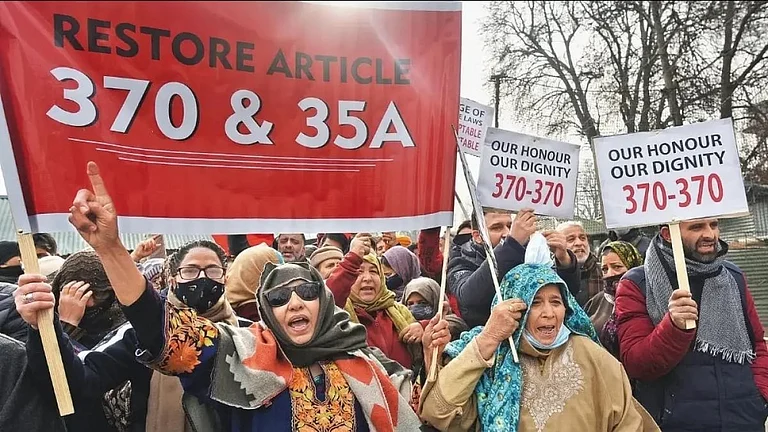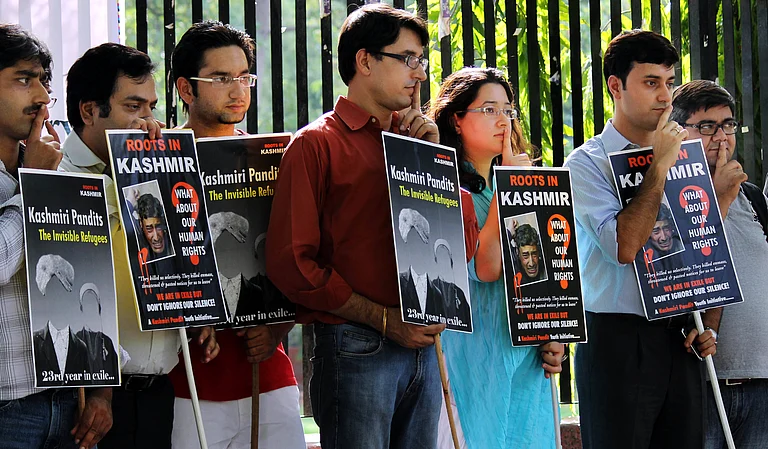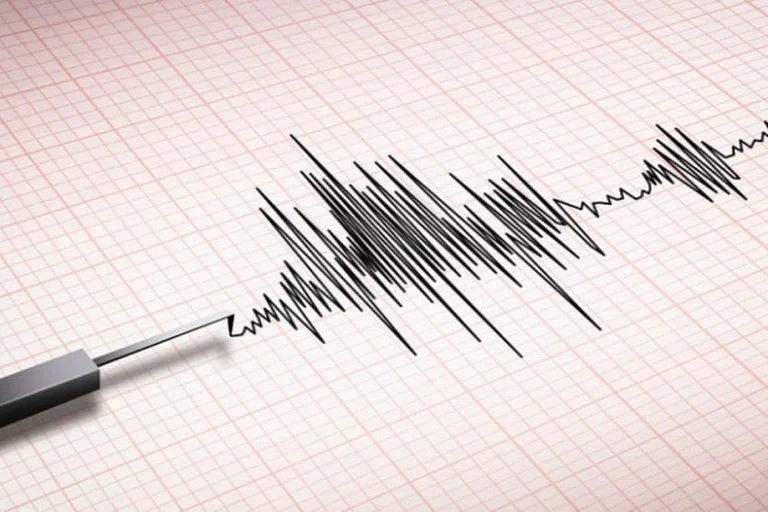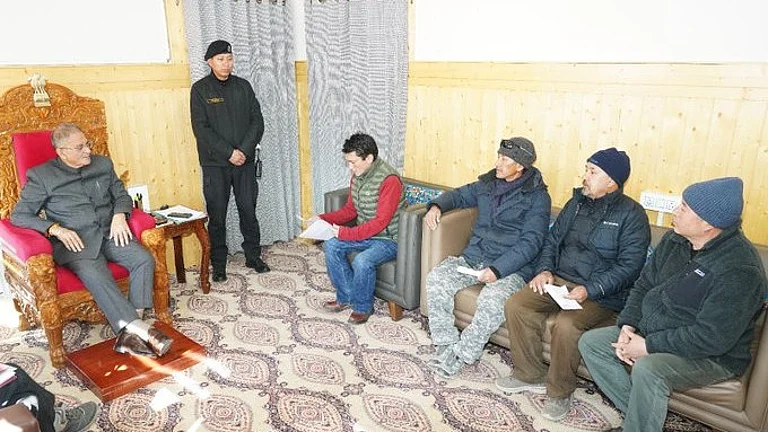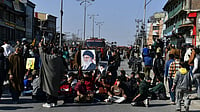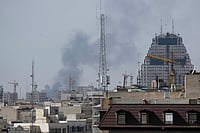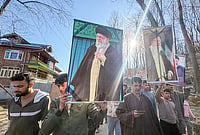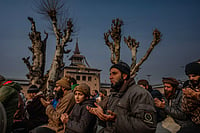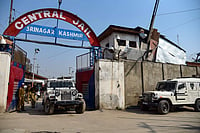
Violence erupted in the Union Territory of Ladakh as protesters demanding statehood and inclusion of the region in the Sixth Schedule of the Indian Constitution clashed with the police, damaging properties and also setting the BJP office in Leh on fire. Four people lost their lives and 30 were injured.
A shutdown call was given today by the Leh Apex Body (LAB) over the delay in holding talks with the Union government on its demands of statehood and Sixth Schedule.
Violence erupted during the protest march in Leh town amidst the shutdown
The Union Territory of Ladakh descended into chaos as protesters demanding the region be granted statehood and also seeking its inclusion in the Sixth Schedule of the Indian Constitution went on a rampage, damaging public property and setting the Bharatiya Janata Party (BJP) office in Leh on fire. Four people lost their lives, and 30 were injured.
A shutdown call was given today by the Leh Apex Body (LAB), which had earlier urged the Union government to hold talks on its demands to avoid deterioration of the health of the people who have been sitting on a hunger strike from September 10. A protest march, which was taken out in Leh town amidst the shutdown, however, went out of control as the youth fought pitched battles with the police. The youth clashed with the police, hurling stones and damaging public property, forcing the authorities to impose prohibitory orders to prevent the gathering of people.
Following the violence, the Leh District Magistrate Romil Singh Donk issued an order under Section 163 of the Bharatiya Nagarik Suraksha Sanhita, 2023, prohibiting the procession, use of vehicles mounted with loudspeakers, and assembly of five or more persons.
Gelek Phunchok, the LAB organising committee member, stated that following the violence in the region, the hunger strike by climate activist Sonam Wangchuk and several people was called off. “Yesterday, the health condition of two elderly people deteriorated, following which they had to be hospitalised. Due to this, we had given a shutdown call, but the situation unfortunately took a violent turn,” he said.
In a social media post, Wangchuk said, “Very sad events in Leh. My message of a peaceful path failed today. I appeal to the youth to please stop this nonsense. This only damages our cause.” Wangchuk, who was joined by over 500 members from different walks of life in the protest each day, began his fast on September 10.
The violence came at a time when the political leadership of Ladakh had hardened its stance against the Union government over the demand for statehood and inclusion of the region in the Sixth Schedule of the Indian Constitution. Although the Union Home Ministry (MHA) has invited the Ladakhi leadership for talks on October 6 with the demand for statehood and the Sixth Schedule to be on the agenda, the fight pitted the ruling BJP against other political groups, including the National Conference (NC) and the Congress in the region ahead of the Ladakh Autonomous Hill Development Council (LADHDC), Leh, polls. The term of the LADHDC, Leh, is set to end in October.
Even as the LAB, which represents the leadership from Leh, earlier stated that the delegation that will hold the talks with the Union government will not be represented by any political figure, politics nevertheless has taken centre stage ahead of the scheduled meeting of the High-Powered Committee (HPC) of the MHA with the leadership of Ladakh. The HPC, under the chairmanship of the Minister of State for Home Affairs, Nityanand Rai, remains in place to chalk out measures to protect Ladakh’s “unique culture and land and employment”.
Ladakhi leaders have held several meetings with the Union government in the past.
The last meeting of the HPC was held on May 27 in New Delhi, where it was decided to reserve jobs for the local population in the region, but the Ladakhi leadership has also sought that the sale of land to non-locals should be prohibited. Locals fear that both the employment of non-locals as well as the sale of land to them would alter the demographics of the region.
The October 6 meeting was scheduled to be attended by both the representatives from the Kargil Democratic Alliance (KDA) and the LAB before the violence, said Glen Phunchok. Last month, leaders and activists from the Ladakh region also sat on a three-day hunger strike in Kargil to demand statehood for the Union Territory.
Earlier, while addressing a press conference, Wangchuk stated that the delay in the holding of the talks by the Union government was only resulting in a trust deficit.
“I had taken a decision that I would hold the hunger strike for 35 days, but there were 500 people who came and joined the strike every day. Last time, a similar situation had arisen, when people had threatened to boycott the LAHDC polls, and the government was forced to initiate the talks. They could have done the same this time as well,” he said.
Ahead of their meeting with the HPC, both the LAB and the KDA slammed the Union government for not only delaying the talks but also keeping the region under bureaucratic control. At present, the Union government directly governs the region through the Lieutenant Governor, Kavinder Gupta. Gupta, a former Deputy Chief Minister who hails from Jammu, replaced Brigadier (retired) B D Mishra as LG in July. Although the elections for the LAHDC were held on October 16, 2020, it lacks the power to frame laws that, the local leaders said, would have helped in the protection of the land and jobs for Ladakhi people.
Political activist Sajjad Kargili said that they have been hoping that the talks of the Ladakhi leadership with the HPC will “restore the democratic rights” of the people.
Residents and activists in Ladakh have demanded that the region be included in the Sixth Schedule of the Indian Constitution, and the constitutional provision should apply to the region on the pattern of some northeastern states, which enjoy financial autonomy through autonomous district councils. The Sixth Schedule demand was based on the ground that over 90 per cent of Ladakh’s population belongs to the Scheduled Tribes. Furthermore, political leaders have sought statehood for the Union Territory, which was carved out of the erstwhile state of Jammu and Kashmir on August 5, 2019, when New Delhi abrogated Article 370 of the Indian Constitution, arguing that this would “ensure the end of bureaucratic rule”.
“Statehood is our main demand, which has been delayed for Ladakh, and the region has been deprived of democracy and is run by bureaucratic rule. We want the bureaucratic rule to end
in the region, and people should get a chance to elect their own legislative assembly,” said Kargili.
Reacting to the violence in the region, Kargili said in a social media post, “Whatever is happening in Leh is unfortunate. #Ladakh, once peaceful, is now gripped by frustration and insecurity due to the Government’s failed UT experiment. The onus lies with the Government: resume dialogue, act sensibly and fulfil Ladakh’s demand for Statehood and Sixth Schedule without delay. Also, I appeal to people to remain peaceful and steadfast.”
BJP General Secretary, Organisation, Ashok Koul, however, said that the demand for the UT was raised for a long time by the people of the Ladakh region. In his comments on Wangchuk’s protest for statehood to Ladakh, he said, “In these protests, there are also statues of those who have fought for the UT status to Ladakh. The demand for granting Ladakh the UT status was from the region itself.”
Chering Dorjay, Deputy Chairman of LAB, however, said that the Union government has not only failed to concede to the
demand of including the Ladakh region in the Sixth Schedule, but has also not shown “any urgency to begin the dialogue and keep the date of invitation on October 6.” He, however, said that there was no politics over the Sixth Schedule demand, and the LAB has decided that it won’t have any “politicians representing any party to be part of the talks with the Centre”. “We have done this keeping in mind the upcoming elections for LAHDC.”
Dorjay further added that former Ladakh BJP MP, Thusptang Chewang, who had earlier stepped aside from the LAB for health reasons, has returned as Chairman. “We have given a list of seven members to the MHA, who will be part of the dialogue process with the Union government.” However, the LAB has kept out former minister and senior Congress leader, Nawang Rigzin Jora, from the delegation that would meet the MHA. “There is no one from either the BJP, the Congress, or the AAP who is part of the LAB delegation that would hold talks with the Union government,” said Dorjay.
Apart from the key demands of statehood and implementation of the Sixth Schedule, the leaders have also sought that the region should get two parliamentary seats, instead of the existing one seat, and have urged the Union government to constitute a Public Service Commission (PSC) for recruitment in the gazetted services.
Kargili said that they were demanding that the recruitments for the gazetted service should be done locally by a PSC in Ladakh. “Since Ladakh is a Union Territory and is spread over a large area, there should be two parliamentary seats, instead of one. Also, Ladakh should have its own gazetted cadre for which the recruitments should be done through the PSC locally,” he said.







